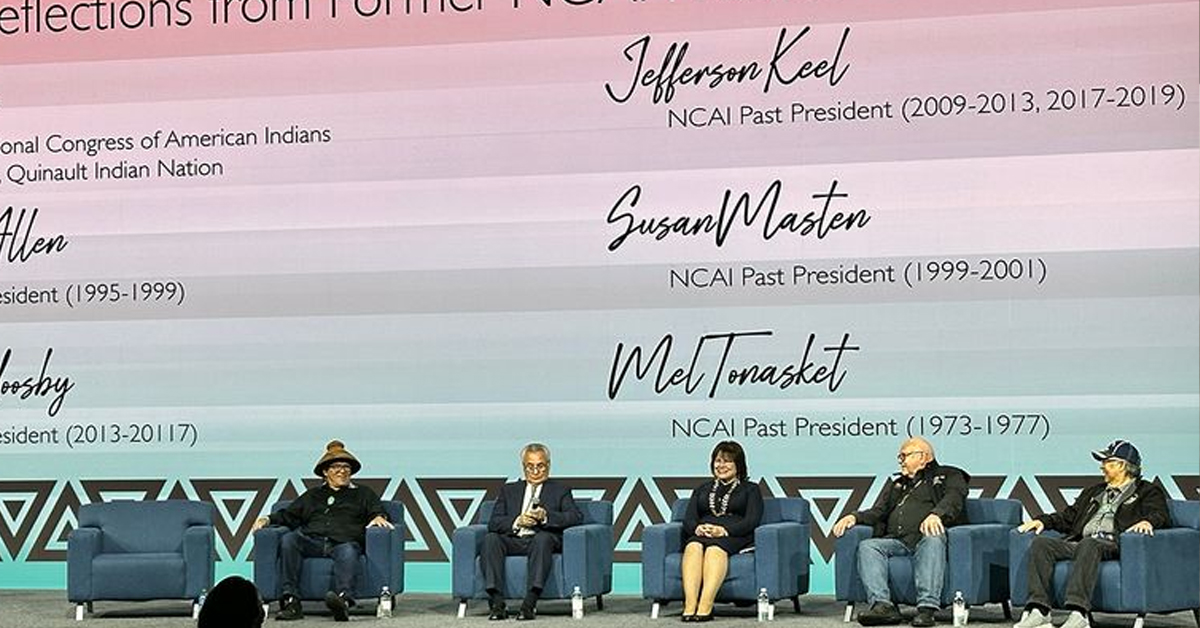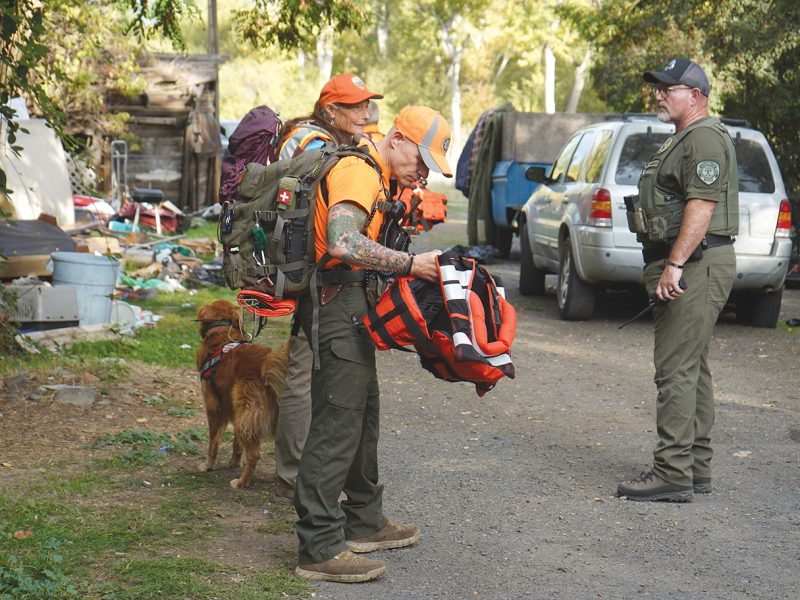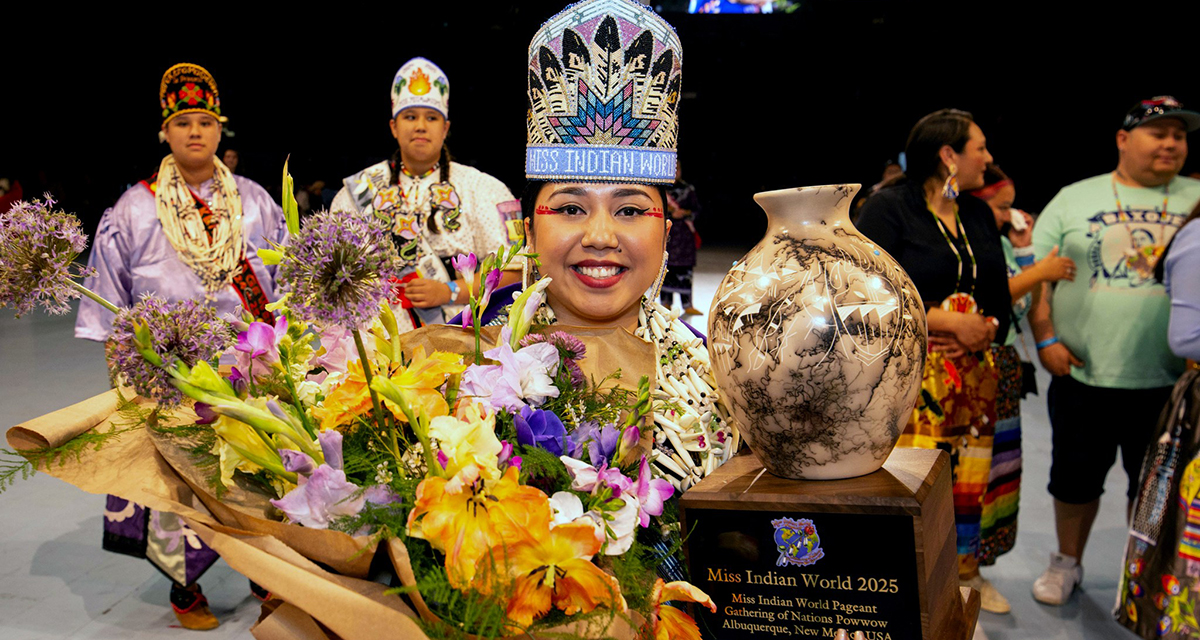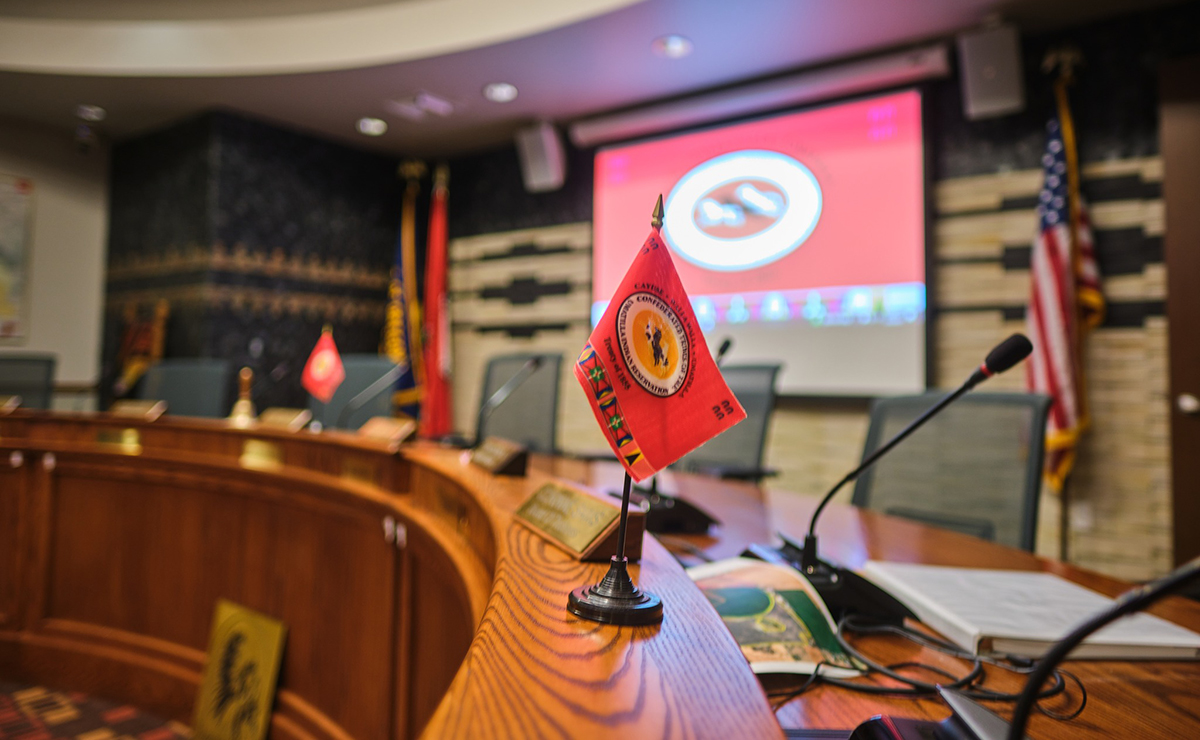On Thursday, members of the National Congress of American Indians will vote on a controversial constitutional amendment that would exclude 24 state-recognized tribes from voting membership.
BY NIKA BARTOO-SMITH
Underscore News + ICT
Lora Ann Chaisson, principal chief of the United Houma Nation, delivered a land acknowledgment Monday at the 80th annual conference of the National Congress of American Indians in New Orleans. She has welcomed many to her homelands over the years, but this time felt extra important. Depending on the outcome of a vote this Thursday, Chaisson’s nation and 23 other member tribes could be excluded from the organization’s voting membership.
“I’m just broken-hearted about this really,” Chaisson told Underscore News. “For you to come here and want to question me — I know who I am and I won’t let nobody bully me. I won’t let no tribe bully me.”
On Thursday, NCAI members will vote to elect a new president. They will also vote on a controversial constitutional amendment. If passed, the amendment would exclude tribes recognized by a state – but not by the federal government – from voting membership.
As principal chief of the United Houma Nation, a state-recognized tribe, Chaisson has been vocal in her opposition to the proposed amendment. It’s a policy that she and other tribal leaders say would go against the founding principles of NCAI.
The founding of NCAI
Established in 1944, during the height of the devastating termination and assimilation policies the U.S. government forced on tribal governments, the mission of NCAI is to “protect and enhance treaty and sovereign rights,” according to its website.
The organization itself has been instrumental in helping some tribes receive federal recognition, while protecting and upholding their tribal sovereignty, according to Marshall Pierite, chairman of the Tunica-Biloxi Tribe. Pierite is running for NCAI president and has expressed opposition to the proposed amendment.
“I do think all tribes should take a look, especially those that just got federal recognition over the last 50 years, and see what an integral role NCAI played in it,” Piertie said.
The proposed amendment
Brought forward by the Eastern Band of Cherokee Indians and the Shawnee Tribe, the proposed amendment would automatically exclude 24 member tribes, according to a statement from John Lowrey, chairman of the Lumbee Nation.
Proponents of the proposed amendment argue that this action is needed to protect tribal sovereignty and prevent “fraudulent groups” who they believe are not Native American tribes.
“Change is needed, and we have an opportunity to do so at the upcoming NCAI convention.”
In a letter to NCAI members, Ben Barnes, chief of the Shawnee Tribe, expressed a similar concern.
“If passed, the proposed constitutional amendment would be a major step forward in our fight to stop the rampant appropriation of our Native identities,” Barnes wrote in the letter.
This is not the first time NCAI members have voted on whether or not to exclude state-recognized tribes from voting membership. In 2012, a similar constitutional amendment proposal was defeated by a vote of 390 to 20, according to an ICT article.
Ahead of Thursday’s vote, tribal leaders across the country have taken a stance.
In a statement published on the NCAI website, Chaisson did recognize that some state tribal recognition processes may not be rigorous enough. However, “the answer cannot be the termination of the entire group based on the illegitimacy of a few,” she wrote.
“The proponents assume that tribal sovereignty is bestowed upon Native communities through federal treaties or that sovereignty is dependent upon holding treaty rights. This is wrong,” Chaisson wrote. “The United States did not bestow sovereign status on tribes by negotiating treaties with them, or through any other means. Those treaties are a taking away of tribal rights and sovereign status is reserved, not granted.”
Other leaders expressed similar sentiments, suggesting proponents of the proposed amendment were letting the U.S. government define Native American identity.
The amendment is facing opposition from both federally recognized tribes and state-recognized tribes, which would be directly impacted should the amendment pass.
For some, it is a direct contradiction to the founding principles of NCAI, which ostensibly seeks to enhance tribal sovereignty.
Currently, there are 574 federally recognized tribes across the country. This means the federal government, through the Bureau of Indian Affairs, has recognized the rights of those tribes to govern themselves and engage in a government-to-government relationship with the federal government, according to the Bureau of Indian Affairs website.
Historically, many federally recognized tribes received that status through treaties with the U.S. government. In the late 1970s, the Department of the Interior issued regulations to handle requests for federal recognition, called the Federal Acknowledgment Process. In the 1990s, Congress enacted the Federally Recognized Indian Tribes List Act, which established three ways a tribe can become federally recognized: by Congress, by administrative procedures under the Federal Acknowledgement Process or by a decision of the U.S. Supreme Court.
However, tribes that were “terminated” by the federal government can only be restored by Congress.
Due to this complicated process, the fight for federal recognition is not easy, and not all tribes choose to pursue it. Others, like the Chinook Indian Nation, have remained unsuccessful in close to two centuries of efforts to gain federal recognition – even with extensive documentation of their tribal status, historical negotiations with major U.S. government representatives, and unratified U.S. treaties.
If the proposed amendment passes, only federally recognized tribes listed in the Federal Register would be eligible voting members of NCAI.
“They are letting the federal government decide who is sovereign and who isn’t,” said Frank Ettawageshik, former chairman of Little Traverse Bay Bands of Odawa Indians and current executive director at United Tribes of Michigan. “Sovereignty does not come from the United States. Tribes are sovereign because of the relation to the creator and to the existence in our lands and our cultures.”
The Lipan Apache Tribe of Texas Tribal Council, expressed opposition to the proposed amendment for similar reasons.
“Changing the meaning of tribal membership so that being Indian means only those who are federally acknowledged can only support a similar colonizing mindset but this time with some Indian people discriminating against other Indian people based on their BIA status,” the council wrote.
In the Pacific Northwest region, the proposed amendment would exclude tribes including Chinook Indian Nation. There, a regional political organization of tribal nations passed a similar resolution about a year ago.
A similar resolution
During its winter 2022 convention, the Affiliated Tribes of Northwest Indians passed a resolution in “opposition to federal or state recognition of the groups claiming to be a tribal nations that seek to circumvent the Department of Interior’s Office of Federal Acknowledgement process.”
Melvin Sheldon Jr., Tulalip, prepared the resolution which was ultimately signed by ATNI president at the time, Leonard Forsman, Suquamish.
According to multiple sources, many members of ATNI were not present during the vote to adopt the resolution, and the resolution itself has been kept fairly quiet.
This resolution potentially has negative implications for ATNI member nations who are not federally recognized, including the Chinook Indian Nation.
“The ramifications of it are directly related to folks who are members of ATNI,” said Tony Johnson, chairman of the Chinook Indian Nation. “Chinook Indian Nation has been a member of ATNI since the beginning.”
The Chinook Indian Nation has fought tirelessly for federal recognition for over 150 years. For a short period of time, the tribal nation had it.
In 2001, Kevin Gover, Pawnee, assistant secretary for the Bureau of Indian Affairs under President Bill Clinton, signed a bill granting federal recognition to the Chinook Indian Nation.
But federal law allows 90 days to file a petition for reconsideration. And on the 89th day, the Quinault Indian Nation filed one.
After 18 months of federal recognition, the federal government stripped that status from the Chinook Indian Nation. The tribe continues the fight to be restored once more.
Today’s outgoing president of ATNI is Fawn Sharp – former chairwoman of the Quinault Indian Nation.
For Johnson, it is difficult to watch members of organizations he is a part of — such as ATNI and NCAI — work to exclude tribes like Chinook.
He is worried about how tribes in the Pacific Northwest might vote at NCAI this week, given the passage of the ATNI resolution.
For him, there is a sort of bitter irony there. In 1957, Roland Charlie, chief of Chinook Indian Nation at the time, represented the Chinook, Tulalip, Makah, Lummi, Muckleshoot and Squamish tribes at the annual NCAI convention.
Looking toward the upcoming vote on Thursday, Johnson pointed to a “colonized mindset” pushing the proposed amendment.
“Are you telling me that the United States government is the best example of how to deal with and identify the Native people of this country? To me that is wild – to see Native people that would say the federal government is correct,” Johnson said. “My community’s sovereignty stems from the land that we are standing on right now and our ancestors.”
While it is still too early to say what will happen Thursday, some tribal leaders are worried about the divide this proposed amendment has already caused.
This comes during a time when NCAI membership has already decreased. Last year, membership hit a low of 180 and as of September, that number is up to around 209, Mark Macarro, chairman of the Pechanga Band of Indians and NCAI presidential candidate, told ICT Broadcast.
“When an organization is weak and divided, there is no way to predict which way they are going to go,” Robert Williams, Lumbee, professor at The University of Arizona Rogers College of Law. “Why would you take a risk to break up an already weakened organization?”
This story is co-published by Underscore.news and ICT, a news partnership that covers Indigenous communities in the Pacific Northwest. Funding is provided in part by Meyer Memorial Trust.





